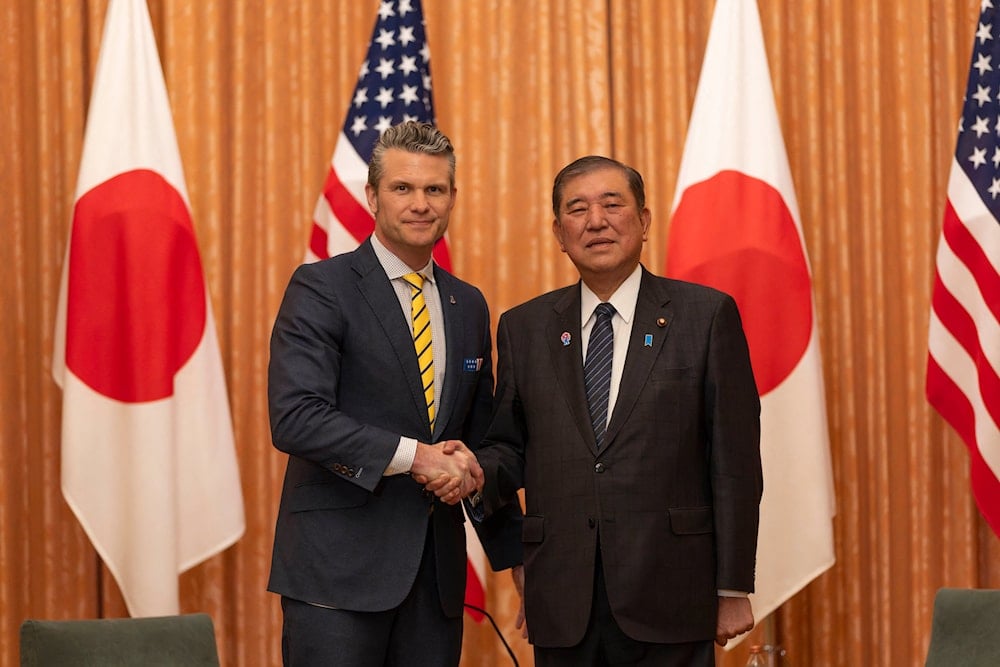US vows ‘robust’ deterrence in Taiwan Strait as ties with Japan deepen
US Defense Secretary Pete Hegseth reaffirmed Washington’s commitment to a strong deterrence across the Taiwan Strait while strengthening military cooperation with Japan.
-
 US Secretary of Defense Pete Hegseth (L) shakes hands with Japan's Prime Minister Shigeru Ishiba during their meeting at the Prime Minister's office in Tokyo on March 30, 2025 (AFP)
US Secretary of Defense Pete Hegseth (L) shakes hands with Japan's Prime Minister Shigeru Ishiba during their meeting at the Prime Minister's office in Tokyo on March 30, 2025 (AFP)
The United States is committed to maintaining a "robust, ready and credible deterrence" across the Taiwan Strait, US Defense Secretary Pete Hegseth said on Sunday, describing China as "aggressive and coercive."
While speaking in Japan, Hegseth refrained from explicitly urging Tokyo to increase military spending, instead expressing confidence that the US ally would "make the correct determination of what capabilities are needed."
"America is committed to sustaining robust, ready and credible deterrence in the Indo-Pacific, including across the Taiwan Strait," he stated, using Washington's preferred term for the Asia-Pacific region.
Beijing has ramped up military pressure on Taiwan in recent years, conducting near-daily air incursions and refusing to rule out the use of force to bring the self-governed island under its control.
Analysts have warned that US President Donald Trump's "America First" policy could weaken Washington’s security commitments in the region. However, Hegseth argued that the previous administration had "created this vacuum, a perception that America was not strong, and wasn't prepared to deter conflicts from starting."
"Our job now at this moment, here with our allies, is to say: We are re-establishing deterrence. Peace through strength, with America in the lead, is back," he told reporters.
The Pentagon chief also announced that Washington would "build an alliance so robust that both the reality and the perception of deterrence is real and ongoing, so that the Communist Chinese don't take the aggressive actions that some have contemplated they will."
Strengthening US-Japan ties
Hegseth, a 44-year-old former infantryman and Fox News commentator, underscored the "extraordinary strength of America's alliance with Japan."
"President Trump has also made it very clear, and we reiterate, we are going to put America first. But America first does not mean America alone," he said, emphasizing that both countries "stand firmly together in the face of aggressive and coercive actions by the Communist Chinese."
There have been expectations that Trump, as he has done in Europe, will push allies in Asia to increase military spending and take greater responsibility for their defense.
"We have a great relationship with Japan. But we have an interesting deal with Japan that we have to protect them, but they don't have to protect us," Trump said earlier this month.
Japan is also grappling with Trump's recent decision to impose a 25% tariff on auto imports starting April 3.
The US currently has 54,000 military personnel stationed in Japan, primarily in Okinawa, east of Taiwan.
During his discussions with Japanese Defense Minister Gen Nakatani, Hegseth stated that he "did not talk specific numbers" regarding defense spending.
"We're confident that Japan will make the correct determination of what capabilities are needed inside our alliance to make sure we are standing shoulder to shoulder," he indicated.
"They have been a model ally and we have no doubt that will continue. But we also both recognise everybody needs to do more."
Nakatani, in turn, emphasized that Japan's defense spending decisions would be made based on its "own judgment and responsibility."
"I also explained Japan has continuously been working on a drastic strengthening of our defence capability... on which we received understanding from the US side," he said.
Expanding military capabilities
Japan has been shifting away from its traditionally pacifist defense posture, moving toward acquiring "counterstrike" capabilities and increasing its military budget to match NATO's two percent of GDP standard.
In a White House summit last year, then-US President Joe Biden and Japanese Prime Minister Fumio Kishida declared a "new era" of cooperation.
This includes the establishment of a new Japan-based US headquarters, which will assume operational oversight of US forces in Japan from the US Indo-Pacific Command in Hawaii.
The headquarters will work alongside Japan’s newly established Joint Operations Command, enhancing military coordination in the event of a crisis involving Taiwan or the Korean Peninsula.
"We will accelerate our efforts to improve inter-operability and conduct effective bilaterally joint activities across the spectrum from peacetime to contingency," Nakatani said on Sunday.
"Expansion of the Japan-US presence in (Japan's) southwestern region is one of our alliance's top priorities," he added.
Read more: Trump pushes Japan to back $44Bln Alaska LNG project for Asia

 5 Min Read
5 Min Read








